

The Book That Started the<br>Quiet Revolution - Quiet Revolution. Passionately argued, impressively researched, and filled with indelible stories of real people, Susan Cain’s Quiet: The Power of Introverts in a World That Can’t Stop Talking shows how dramatically we undervalue introverts and how much we lose in doing so.

Taking the reader on a journey from Dale Carnegie’s birthplace to Harvard Business School and from a Tony Robbins seminar to an evangelical megachurch, Cain charts the rise of the Extrovert Ideal in the twentieth century and explores its far-reaching effects. She talks to Asian-American students who feel alienated from the brash, backslapping atmosphere of American schools.
She questions the dominant values of American business culture, where forced collaboration can stand in the way of innovation and where the leadership potential of introverts is often overlooked. And she draws on cutting-edge research in psychology and neuroscience to reveal the surprising differences between extroverts and introverts. See all acclaim for Quiet > Quiet, Please: Unleashing 'The Power Of Introverts' Introverts, who prefer quieter, lower-stimulation environments, have trouble thriving in today's extrovert-oriented culture, says author Susan Cain.
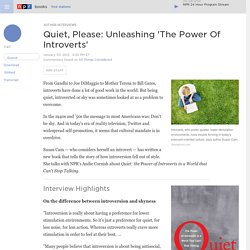
iStockphoto.com hide caption toggle caption iStockphoto.com From Gandhi to Joe DiMaggio to Mother Teresa to Bill Gates, introverts have done a lot of good work in the world. But being quiet, introverted or shy was sometimes looked at as a problem to overcome. Susan Cain’s ‘Quiet’ Argues for the Power of Introverts. My neighbor, a leadership development consultant who regularly helps people improve themselves through personality tests like the Myers-Briggs Type Indicator, once told me I was the most introverted person he’d ever met.
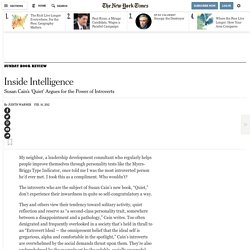
I took this as a compliment. Who wouldn’t? The introverts who are the subject of Susan Cain’s new book, “Quiet,” don’t experience their inwardness in quite so self-congratulatory a way. They and others view their tendency toward solitary activity, quiet reflection and reserve as “a second-class personality trait, somewhere between a disappointment and a pathology,” Cain writes. Too often denigrated and frequently overlooked in a society that’s held in thrall to an “Extrovert Ideal — the omnipresent belief that the ideal self is gregarious, alpha and comfortable in the spotlight,” Cain’s introverts are overwhelmed by the social demands thrust upon them.
Photo. 10 Ways Introverts Interact Differently With The World. Introverts and extraverts may seem the same on the surface, but if you look at the way they respond to life’s everyday occurrences, differences begin to emerge.
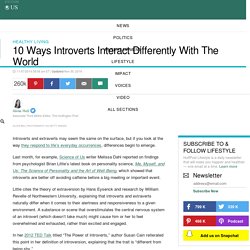
Last month, for example, Science of Us writer Melissa Dahl reported on findings from psychologist Brian Little’s latest book on personality science, Me, Myself, and Us: The Science of Personality and the Art of Well-Being, which showed that introverts are better off avoiding caffeine before a big meeting or important event. Little cites the theory of extraversion by Hans Eysenck and research by William Revelle of Northwestern University, explaining that introverts and extraverts naturally differ when it comes to their alertness and responsiveness to a given environment. 23 Signs You're Secretly An Introvert. Think you can spot an introvert in a crowd?
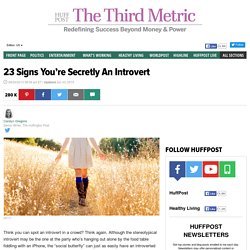
Think again. Although the stereotypical introvert may be the one at the party who’s hanging out alone by the food table fiddling with an iPhone, the “social butterfly” can just as easily have an introverted personality. “Spotting the introvert can be harder than finding Waldo,” Sophia Dembling, author of “The Introvert’s Way: Living a Quiet Life in a Noisy World,” tells The Huffington Post. “A lot of introverts can pass as extroverts.” People are frequently unaware that they’re introverts -– especially if they’re not shy — because they may not realize that being an introvert is about more than just cultivating time alone.
“Introversion is a basic temperament, so the social aspect — which is what people focus on — is really a small part of being an introvert,” Dr. Despite the growing conversation around introversion, it remains a frequently misunderstood personality trait. 1. 2. 3. 4. 5. 6. 7. 8. 9. 10. 11. 12. Caring for Your Introvert. From Atlantic Unbound: Interviews: "Introverts of the World, Unite!
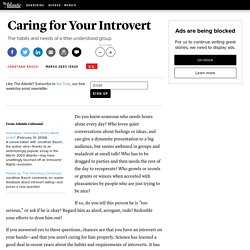
" (February 14, 2006) A conversation with Jonathan Rauch, the author who—thanks to an astonishingly popular essay in the March 2003 Atlantic—may have unwittingly touched off an Introverts' Rights revolution. Follow-up: The Introversy Continues Jonathan Rauch comments on reader feedback about introvert dating—and poses a new question Do you know someone who needs hours alone every day? Who loves quiet conversations about feelings or ideas, and can give a dynamite presentation to a big audience, but seems awkward in groups and maladroit at small talk? If so, do you tell this person he is "too serious," or ask if he is okay? If you answered yes to these questions, chances are that you have an introvert on your hands—and that you aren't caring for him properly. I know. Oh, for years I denied it. What is introversion? Extroverts are energized by people, and wilt or fade when alone. Susan Cain: The power of introverts.